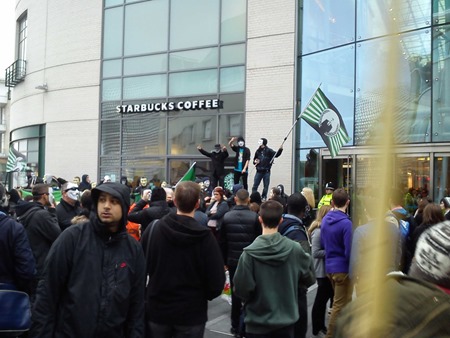Protestors rally outside Starbucks in Birmingham City Centre
The right to protest is a fundamental and respected right of the United Kingdom’s democracy and over the past couple of years we have seen many protests of varied causes take place in cities and towns across the Isles. Carefully and tactically planned, the aims of these protests are clearly to try and create change by winning over those around them with their cause, gathering more supporters and influencing the public opinion as a whole. However, the opposite effect can often be the result; rather than join the cause, the public criticise the protestors for “disrupting the working day”.
The anti-cuts and anti-tax-evasion pressure group, Anonymous, protested in the city centre of Birmingham on Saturday 5th January. Demonstrating outside major high-street retailers and banks such as HSBC, Vodafone and BHS, the group rallied outside the Bullring Shopping Centre, causing the entire building to be locked down with shoppers stuck inside and outside waiting for them to disperse. Among those waiting outside was a shop-owner who complained to those protesting that they were interrupting his working day and causing him to lose money. Inside the shops, staff members barricaded the doors to stop those protesting from getting inside as customers were moved towards safety at the back of the shop. Commercial behaviour in Birmingham was brought to a standstill.
My guessing is if protesters who stormed @bullring had jobs they could afford to shop too. Try working and not disrupting my day.
— Mark Rice (@StaffsMark) January 5, 2013
Compassion can be felt all-round. There is some agreement with the cause that the cuts are hard and detrimental and that tax-evasion by major corporations is unjust and immoral and there is agreement that a protest should be held to demonstrate this anger as an effective way of raising awareness and rallying support. But there is disagreement over the method and tactics used by these pressure groups in order to do the former. The question raised is whether it is effective and fair to demonstrate outside the individual high street stores. It is arguable that it is neither and this is an opinion that many observers in the streets raise.
An apparent lack of consideration appears to prevail in the organisation of a protest outside a high-street. The fact that the employees of these companies have little or no say into the governance of the corporation as whole appears forgotten in the minds of protestors. Hence, the method of attacking individual shop stores is ineffective and often ignored by the decision-makers. In essence, the protestors are simply instilling fear in the hearts of the employees and customers of these shops as well as increasing a negative perception of themselves and their cause, creating the opposite of the desired effect.
However, the alternative (to protest outside the headquarters of the major corporations to the decision-makers themselves) is difficult. Usually these businesses are placed in locations far from the major public eye, reducing awareness-raising and there’s no way of knowing when the senior bosses are actually present at the headquarters to take note of the protestors concerns. Even if they are, it is not necessarily going to make any difference. Upon observation of previous examples (i.e. most protests outside the Houses of Parliament, Downing Street or Millbank), it is uncommon that we can see any direct effect on impending legislation.
The right to protest is one that should remain, but the ability and effectiveness of protests is minimal. Hence, the organisation of a protest must be more thoroughly considered before it is carried out, or the risk of making no effect but a diminishing level of support is highly likely. The protests witnessed in Birmingham and the comments during and after them simply show the disastrous effects of an ill-thought-out demonstration.


